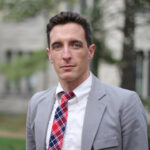Meet a Fellow: Ken MacLeish
 Meet Ken MacLeish, a 2021-2022 RPW Center Faculty Fellow. This year’s group is exploring the theme of “Environments.”
Meet Ken MacLeish, a 2021-2022 RPW Center Faculty Fellow. This year’s group is exploring the theme of “Environments.”
What does the phrase “Environments” mean to you?
“Environments” to me are the collections of things—places, objects, forces, non-human and even human life—that are socially designated as “other” to humanity but which are too materially, biologically, symbolically, or politically important for humans to ignore, and which humans themselves also transform. The sheer diversity of cultural frameworks that people employ for understanding the worlds around them show that the idea of environments may be universal, but their definition is diverse, changeable, and highly contested.
At the same time, genres like memoir, immersive journalism, or in my case, ethnography help illuminate what the people involved in making war actually do, think, and feel without resorting to familiar narratives of national security or patriotic heroism, and they give a human scale to that same system of violence.
As a cultural anthropologist, I’m interested in how societal and political forces shape not only what counts as an environment, but whose definitions, evidence, experiences, and wellbeing counts as well. Things like resource extraction, environmental racism, and climate justice are not only policy issues or advocacy agendas, but windows onto how we see and construct an unequal world.
In my research project for the seminar, which looks at toxic practices of military waste disposal in US war zones, these questions of definition and contestation have answers that vary with the perspective they are posed from. Over the course of the US’s recent wars in Iraq and Afghanistan, everyday waste from military installations was disposed of in pits where it was doused with diesel and set on fire. Everything was disposed of in these burn pits, from computer parts, office supplies, and plastic water bottles, to batteries, ammunition, and medical waste, and the resulting smoke contained fine particulates and volatile organic compounds associated with respiratory diseases, cancer, autoimmune conditions, and other maladies.
In the US, most discussion of the pits focuses on the military’s callous exposure of its personnel to these harms and the perceived failure of the Veterans Health Administration to provide afflicted veterans with the care and compensation they need. From this perspective, burn pits raise important questions about medical evidence, bureaucracy, and societal accountability.
But from a broader perspective, the very practice of burning waste in an invaded country is premised both on Orientalist assumptions about “dirty” local environments and on an imperialist privilege to pollute foreign spaces. This perspective helps reveal the centrality of environments to the destruction wrought by US military intervention in Iraq, Afghanistan, and around the world.
Looking more broadly still, the US military is, on its own, one of the largest CO2 emitters in the world, with a climate impact equivalent to that of a small, highly industrialized nation. In a world made more politically unstable by climate change and resource conflicts, the US’s choice to retain a military many times larger than any other country’s also has effects on humanity’s shared, global environment.
What initially sparked your interest in your research?
I have always been interested in the ways that, in the US, war is largely regarded as a kind of extreme exception to our everyday norms, values, and expectations, even though this country builds and uses military force on a globally unique scale. The US has spent the last two decades deeply involved in armed conflict, and yet war remains incredibly remote from most Americans’ experience.
Looking closely at what war actually consists of—the things its participants actually do, say, and feel—grants critical perspective on this vast system of violence that has been rendered utterly routine, regardless of what one believes about the politics of particular conflicts. At the same time, genres like memoir, immersive journalism, or in my case, ethnography help illuminate what the people involved in making war actually do, think, and feel without resorting to familiar narratives of national security or patriotic heroism, and they give a human scale to that same system of violence.
What was your first job and what did you learn from it?
My first paid job was pulling weeds, clearing brush, and laying mulch for my school’s nature trails. It was grueling and sweaty, but I loved the woods and I got to spend all day there with my friends. I learned that “nature” was apparently the thing we were preserving or enhancing, but also the thing that we were managing and conquering. And I learned how to use a scythe.
Ken MacLeish, PhD, is Associate Professor of Medicine, Health & Society and Anthropology. His research focuses on bodily and emotional experiences of contemporary war; the emergence and contestation of war-related illness and injury; and the representation of US war-making in policy, veteran care practices, and American public culture. He is the author of Making War at Fort Hood: Life and Uncertainty in a Military Community (Princeton University Press, 2013), and his scholarship has appeared most recently in BioSocieties, Ethnos, Security Dialogue, and Cultural Anthropology.
